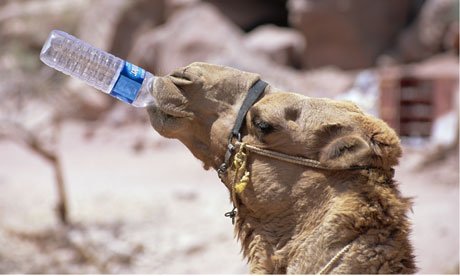When we talk about global warming and the consequences it will have for our planet we tend to think about this from the angle of how it will affect us and what it will do to our living conditions and lifestyles. As the temperature of the Earth increases this will cause a range of more severe weather conditions, damage crops, reduce the wildlife population and cause us to lose land to rising sea levels.
But when it comes to devastating impacts of the environment, there are few things more potentially terrifying than the thought of running out of drinking water. Of course all of us require drinking water to survive and without it we would have no way to sustain ourselves. With developing countries struggling to find clean water to drink, could we one day face the same fate? Or is thinking so just hysteria? Let’s look at the facts.
We Will Never Run Out of Water
First of all the good news – we will never run out of water completely. No matter how bad things get, we will always have water in the sea as the amount of water on the planet never decreases. Every time you use water to run a bath that water returns to the sewers and then re-enters the water system. Sure it costs energy to clean, but ultimately it stays the same.
What about the water you use to water your garden then? Well the good news is that once again this doesn’t actually get destroyed in any real way. It might get absorbed by the soil, or consumed by plants, but ultimately it will in some way return to the surface and be evaporated by the sun at which point it will then rise into the atmosphere to form clouds and eventually rain which we can then once again harvest and clean.
But what about drinking water?
We Could Run Out of Drinking Water
The bad news is though that we could run out of clean water. This is because the majority of the Earth is composed of salt water (97% in fact) – with 77% of our fresh water being frozen at the poles. This then means that there’s only a small amount of water we can actually drink or use for other things such as farming and washing. That leaves us with less than 1% of the water to drink.
The existing water we have meanwhile might remain in ‘circulation’ mainly, but the water that you drink and that you use to hose the garden will take much longer to work its way back into the system compared to how quickly you drink more and not all of it will return. If water evaporates and turns to rain, then of course only some of that will end up back in clean water reservoirs rather than the sea.
Many of our activities meanwhile are polluting the water further (both our sea water and our fresh water supplies) and increases in population are putting more and more demand on our dwindling water supplies.
What Can We Do?
The good news is that there are solutions to these problems, and governments will generally attempt to collect and purify water using damns. However in some countries this is more difficult than others, and in developing countries like Burma providing clean water supplies is a very real challenge – particularly when the locals may not be familiar with the importance of keeping their water sanitized.
Damns have other problems too, being large structures that interfere with the local environment, and losing a lot of water to evaporation and other similar problems exist with other forms of water collection and sanitation.
Of course it is possible to purify sea water making it drinkable, and we have been doing just that since ancient Greece, but this too is very expensive and cost prohibitive. On large scales to provide water for cities this is incredibly difficult, as is transporting said water to where it is needed most.
Really then the problems with water are more to do with education, technology, cost and energy than they are to do with any actual lack of water. We have plenty of water, and we have the means to make it drinkable – we just need to learn how to take advantage of this before we run out of our existing supply, and we need to find more environmentally friendly and renewable sources of energy in order to do that. The race is on!
